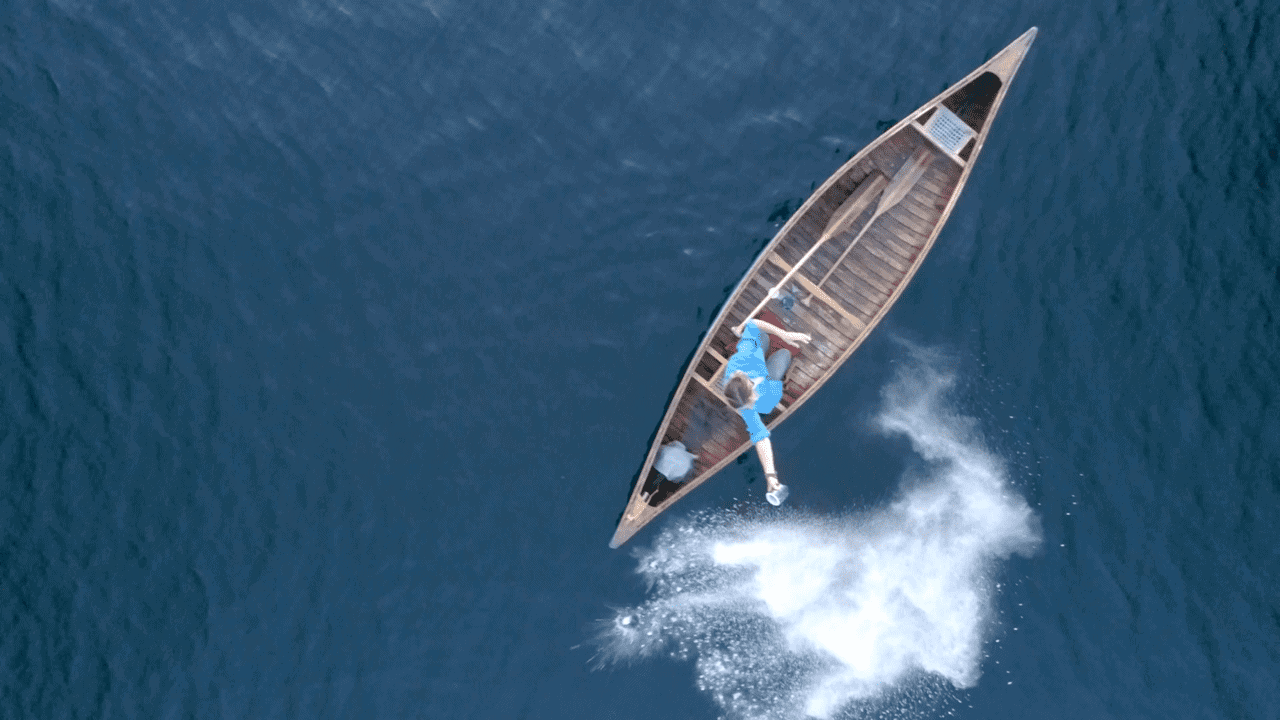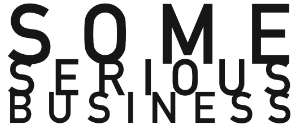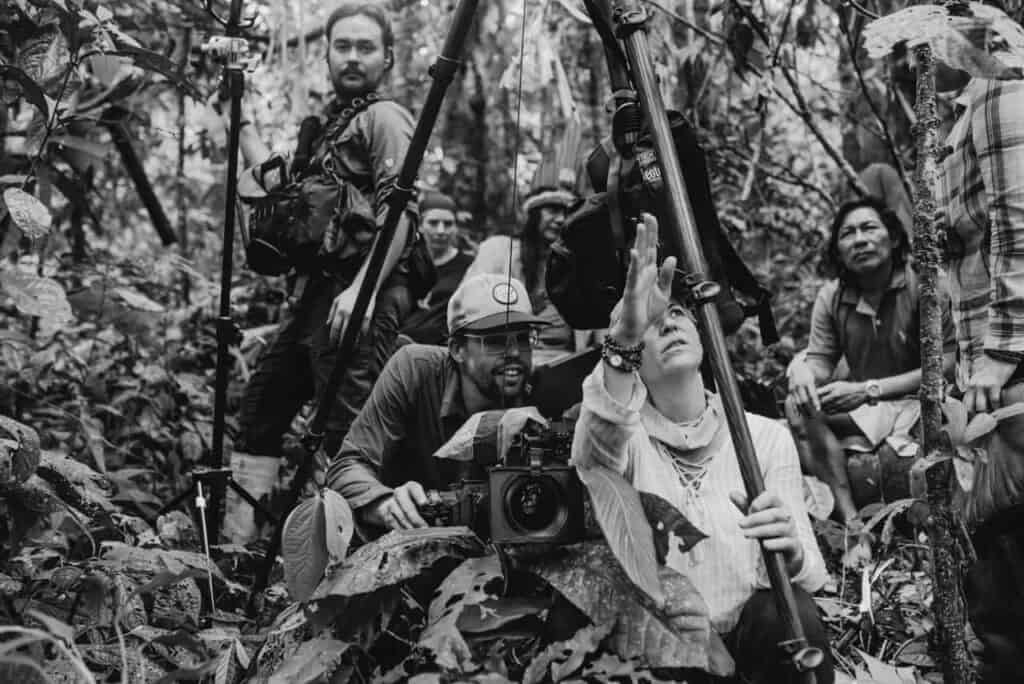SSB Away Hosts Filmmaker Jennifer Abbott
Climate change destabilizes more than the weather. It also destabilizes us. —Jennifer Abbott
Some Serious Business is pleased to welcome artist in residence Jennifer Abbott and to present her visionary thoughts and personal recollections in our #FiftyQuestions series. Abbott is a self-taught filmmaker and media artist who uses her master-level skill sets—writing, directing, editing, sound design, and production—to actualize her prescient films and tap into the cultural zeitgeist. Her film, The Corporation is considered the most successful documentary in Canadian history including 26 international awards (It was the first Canadian film to be awarded at Sundance), and Naomi Klein has called her recent documentary, The Magnitude of All Things, “a powerful film about climate grief.”
The Magnitude of All Things draws intimate parallels between the experiences of grief—both personal and planetary. Stories from the frontlines of climate change merge with recollections from the filmmaker’s childhood on Ontario’s Georgian Bay. What do these stories have in common? The answer, surprisingly, is everything. The film takes us around the world to witness a planet in crisis: from Australia’s catastrophic fires and dying Great Barrier Reef, to the island nation of Kiribati, drowned by rising sea levels. In Nunatsiavut, melting ice permanently alters the landscape, while in the Amazon rainforest, Indigenous people fight a desperate battle against oil and mining extraction.
SSB is pleased to collaborate with Únashay for a public screening of The Magnitude of All Things, as part of Unashay’s first Noria (grief) café on Saturday, August 20th, 5-9 PM. Janeen Singer and Aimee Wilson will lead the Café and Jennifer will speak about her experiences making the film. Read more about the August 20 event here.
In my travels and reflections, I don’t pretend to have found the answers. But I have learned transformation includes questioning the foundational tenants of the dominant climate-destabilizing culture. One place to start is by leaning into the nonhuman and understanding the world as a collaborative, reciprocal, interdependent place with all these other ways of being, plant and animal. As our identity expands to include the living planet, we no longer breath the air. The air breaths us. From that place of surrender, clear-seeing, resilience, and resistance become possible. —Jennifer Abbott from her SSB Away artist statement
Jennifer Abbott #FiftyQuestions
What one sentence do you hope describes how your art practice will be recorded in history, and why?
Jennifer Abbott made us think differently about the world…
In thinking of the lulls and gaps or lost places in your practice over the years, who or what has re-energized you?
Re-energized by being in forests or under the stars; and by what feels like a calling as a media artist living in an era of social and environmental collapse to create work that questions hegemonic and destructive conventions and systems.
What project of yours do you personally consider your most satisfying, and why – regardless of external support or accolades?
The Magnitude of All Things because it feels like the culmination of a decades-long media art practice…
If you could travel in time, within what era or milieu would you most like to have an artist residency? And why?
1920s Montparnasse, Paris; the free spirit and brilliance of so many artists, musicians and writers who lived in this inspired neighborhood and of course, the food and fashion
Do you have a relationship with the distant future—in other words, are you making artwork that bears a message or impact for coming generations?
Being intimately aware of multiple existential crisis (take your pick!) brings with it an awareness as an artist of future generations (both human and nonhuman) and a motivation to create work that contributes to the cultural project of turning away from economies of ecocide and towards regeneration, respect, and justice.
Can you recall your first memory of bliss in self-expression?
Watching a particle of dust fall in sunlight as the world slowed and my body and mind dropped away, lost in creation, circa 1995.
Do you have a relationship with an animal in your life that influences your art process?
My rescue pup Lotus, named for the flower that blooms in the mud. She’s a walking mnemonic device reminding me of joy amidst loss (plus extremely cute and a total love bomb).
How deeply do you feel your self-expression is impacted by the field in which you work – its morés, standards, culture, legacies—and how so?
I’ve always trusted my gut and knowing how many hurdles there will be to jump and the tenacity needed to do so, I’ve created work that meant everything to me partially for its sheer staying-power effect. I’ve paid little (conscious) attention to mores etc. though unconsciously, who knows! Like all of us, I’m deeply embedded within and influenced by the culture around me.
How would you describe your ideal relationship with other artist colleagues?
As a woman director, I feel I have a more collaborative, less hierarchical approach to filmmaking, still with a strong vision but working to achieve it through valuing the unique strengths of every team member
Do your dark nights of the soul tend to be constructive or destructive to your self-expression?
Constructive, to a point…
Is destruction a positive phenomenon for you?
It can be if I surrender to it.
What is your artistic relationship to loss? Either personal loss, or lost works of art, or other kinds of loss?
The impermanence of all things seems foundational to me to understand as a person and artist (and very much contrary to the death denying, youth-celebrating material culture of our era). My last film The Magnitude of All Things was entirely about coming to terms with our deepest fears and sorrows around personal and planetary loss.

When does joy tend to visit you?
In the giant forests of the Pacific Northwest, under the full moon illuminating the ocean, near a pond in Spring with every other sound drowned out by a chorus of frogs; those sorts of things. Also, sometime, when deep in Zazen (my Zen Buddhist meditation practice), growing and preparing food, sharing good food and wine, and seeing my children come into themselves as people.
If you could amplify a specific sense, which would it be? If you could minimize s specific sense, which would you choose?
Selectively amplify – sight / Selectively minimize – sound
If you could create a new public institution for your field, what would its mission be?
The (Anti) Art Institution to Upend the Status Quo
Who or what do you feel is most invisible to others in your practice?
The amount of work and the sacrifice…
How important is it to you that others connect and understand and appreciate your work?
I don’t make my work just for me, so I’d say very important that it resonates, provokes different emotions and even for some, has a transformative effect on their lives.
What makes you most likely to shut down or go into dormancy as an artist?
Overwhelm and too much in other parts of my life demanding energy.
Do you have a particular skill or knack of which you are most secretly proud? Something you feel you can do that few others can, no matter how small?
I think I’m especially proud that I sometimes do so many roles when making my films; writer, director, editor and sound design. That’s rare for the kind of high production value films I make.
Which would you prefer: to be a rogue artistic outsider or to fit within a community of similarly-minded creators?
I’d want to be rogue but not necessarily alone. So rogue within a community of other rogues – but not prima donnas or there will surely be more drama than artmaking!
If you could be anything besides an artist in human form, what would you like to be?
A dragon.

